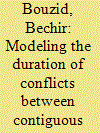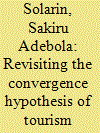| Srl | Item |
| 1 |
ID:
128949


|
|
|
|
|
| Publication |
2014.
|
| Summary/Abstract |
Several studies have devoted considerable energy toward explaining the occurrence of international conflicts between contiguous states. Despite the well-developed multidisciplinary approaches analyzing militarized disputes, which have predominately focused on studying the geographical dimension as an additional explanatory predictor of rivalry disputes, only very few research papers have considered modelling the duration of conflicts between neighbouring states. Using the event history analysis, we propose, rather than investigating the standard theoretical questions of why neighbouring states do fight each other, or alternatively, what factors commonly influence the dispute outcomes between those rival countries, instead to answer the question: Once it breaks out, what role does the geographic proximity of opponent states play when interacting with other factors, extending or conversely shortening the crisis period? One of the most relevant insights of the present work is that disputes that occur between adjacent countries tend to be shorter when joint democracies are involved, and when countries are dependent economically on each other. The presence of a territorial issue at stake or a long history of hostility over disputed areas tends to prolong the tension period as those disputes often include nationalism dimensions that increase the difficulty of reconciling the divergent views on the issues at stake. On the contrary, the present research does not provide strong support for some of the theoretical suggestions formulated by certain scholars regarding the positive correlation between the nature of opposing powers and the duration of conflict between neighbours.
|
|
|
|
|
|
|
|
|
|
|
|
|
|
|
|
| 2 |
ID:
128310


|
|
|
|
|
| Publication |
2014.
|
| Summary/Abstract |
The purpose of this article is to examine the convergence hypothesis in South Africa's tourism markets over the period January 2000-December 2011. To check the existence of convergence, the study follows existing papers by applying a unit root test on the difference series and a cointegration test on the original series of visitor arrivals. Premised on geographical dimension, we further investigate cluster-based convergence within African and overseas source markets in South Africa. The results provide evidence for long-run convergence in tourism markets. Furthermore, the findings of cluster-based convergence provide greater support for the convergence within African and overseas source markets, respectively. These findings imply that previous policies aimed at boosting total visitor arrivals in South Africa have been successful, and maintaining such (or similar) strategies may continue to enhance international visitor arrivals in the country.
|
|
|
|
|
|
|
|
|
|
|
|
|
|
|
|